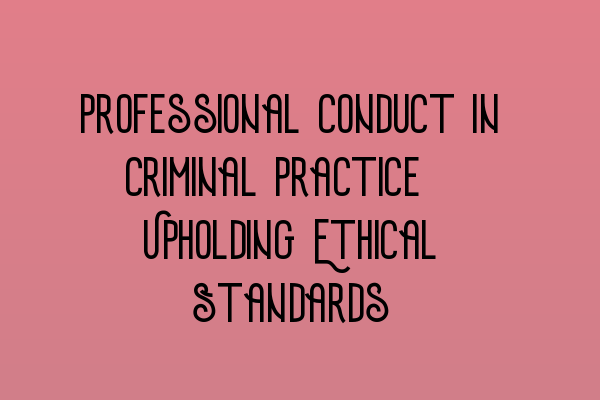Professional Conduct in Criminal Practice: Upholding Ethical Standards
As legal professionals, it is our duty to uphold ethical standards and maintain the highest level of professional conduct. This is particularly crucial in the field of criminal practice, where the balance of justice hangs in the hands of those involved in the legal process.
The Importance of Professional Conduct
Professional conduct is not simply a matter of personal integrity; it is an essential aspect of the legal profession that helps maintain confidence in the legal system. Upholding ethical standards ensures fairness, integrity, and the protection of clients’ rights.
It is important for criminal practitioners to understand and abide by the Solicitors Regulation Authority (SRA) Code of Conduct, as well as any specific rules and regulations set forth by the Criminal Procedure Rules and the Bar Standards Board. These guidelines provide a framework for conducting oneself in a professional and ethical manner.
Client Confidentiality
One of the fundamental principles of professional conduct is maintaining client confidentiality. This means that all information disclosed by a client must remain privileged, unless there is a legal obligation to disclose or it is in the best interest of the client.
By strictly adhering to client confidentiality, criminal practitioners demonstrate trustworthiness and safeguard their clients’ interests. It is important to remember that breaching client confidentiality can not only damage your professional reputation but may also have serious consequences for your client’s case.
Conflict of Interests
Avoiding conflict of interests is another crucial aspect of professional conduct. Criminal practitioners must avoid any situation where their personal interests, relationships, or obligations could compromise their duty to act in the best interest of their clients.
In cases where a conflict of interest arises, it is important to promptly disclose the conflict and recuse yourself from the case. This ensures that your clients receive unbiased and impartial representation.
Honesty and Integrity
Honesty and integrity are the backbone of professional conduct. Criminal practitioners must be honest and transparent in their communications with clients, colleagues, and the court. This includes providing accurate advice, disclosing any conflicts of interest, and presenting evidence truthfully.
Additionally, it is important to act with integrity by fulfilling professional obligations, maintaining competence, and respecting the rules and procedures of the legal system. This includes timely submission of documentation, punctuality, and diligent preparation for court appearances.
Continuing Professional Development
To maintain high ethical standards, criminal practitioners must engage in continuing professional development (CPD). This involves staying up-to-date with changes in laws, regulations, and legal precedents that may impact the field of criminal practice.
CPD not only enhances legal knowledge but also ensures that criminal practitioners are equipped to handle complex cases, provide accurate advice, and effectively advocate for their clients. SQE 1 and SQE 2 preparation courses and practice exams can be valuable resources for criminal practitioners looking to enhance their knowledge and skills.
Conclusion
Professional conduct in criminal practice is of utmost importance. Upholding ethical standards ensures fairness, integrity, and the protection of clients’ rights. By maintaining confidentiality, avoiding conflicts of interest, acting with honesty and integrity, and engaging in continuing professional development, criminal practitioners can fulfill their duty to the legal profession and the clients they represent.
For more information on SQE 1 practice exam questions, SQE 1 practice mocks (FLK1 and FLK2), SQE 2 preparation courses, SQE 1 preparation courses, and SRA SQE exam dates, please follow the related article links provided.
Related Articles:
